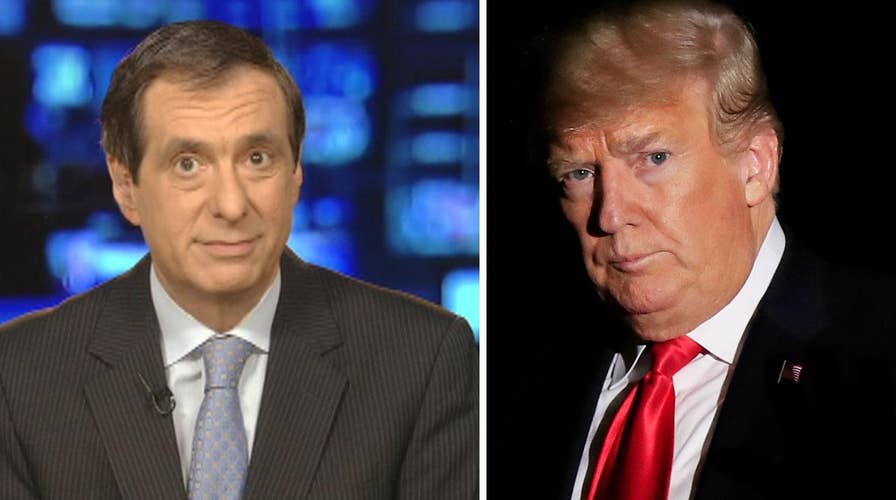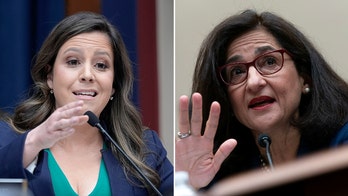Kurtz: Trump-era frustrations lead to attack on institutions
'MediaBuzz' host Howard Kurtz weighs in on how liberal resentment toward the Trump administration is spreading to other institutions like the Senate and electoral college.
Liberals who are unhappy with the confirmation of Brett Kavanaugh are starting to complain that the Senate itself is undemocratic.
Liberals who are unhappy with Donald Trump as president are starting to complain that the way he was elected is undemocratic.
While there's a fascinating political-science debate to be had on both points, it has the potential to smell like sour grapes from those on the losing side.
I just don't think it's a winning argument to say that the problem is these institutions, and rules that have been in place for more than 225 years, rather than the failure to prevail in debates and win elections.
The attack on the Senate stems from the 1787 compromise that is at the heart of the Constitution: House members are elected by population, which favors big states, and each state gets two Senate seats, which gives a disproportionate advantage to small states. Without that, the founders never could have rounded up enough votes.
But now the formula is highly objectionable. NBC reporter Ken Dilanian tweeted, "It may not happen in our lifetimes, but the idea that North Dakota and New York get the same representation in the Senate has to change." He cited a Washington Post piece complaining that senators representing less than half the country were about to confirm a Supreme Court nominee opposed by most Americans.
While we're at it, why don't we just have all public issues settled by polls?
It can seem unbalanced on its face for states with small populations (North Dakota has 755,000 people) to have equal weight in the Senate. But look at the flip side: California has 53 House seats, and North Dakota has one.
And the fear in small states of being overrun is the same as in the late 18th century, when slavery divided North and South.
These days, as The Federalist notes, the formulation doesn’t always favor the GOP:
"If you weren't born yesterday, you might recall that as recently as 2011, the Democrats controlled the White House, 59 percent of the House, and a filibuster-proof 60 percent of the Senate. Under the same laws, the same Constitution, and with an almost identical electorate, the Democrats controlled the political branches of government with huge majorities. How did they lose it all? Because the people did not like what they did with that power once they had it ...
"The focus on small states as Republican strongholds does not survive even the gentlest scrutiny. The senators from the ten smallest states are nine Democrats, nine Republicans, and two independents who caucus with the Democrats. That’s an 11-9 split in Democrats' favor."
A similar argument surfaces with the renewed assault on the Electoral College. And it's not hard to figure out why: Both Trump and George W. Bush, the last two Republican presidents, lost the popular vote while winning the White House.
Suddenly we have criticism like that of Damon Linker in The Week:
"The Electoral College is an abomination. It's long past time we abolished it.
"The Electoral College was a dumb idea when it was first proposed. Today, it's the Constitution's most egregious affront to elementary fairness. In a just and properly functioning political system, it would be eliminated without delay or regret."
And Julia Ioffe, a GQ correspondent, tweeted: "We are a country where two presidents who both lost the popular vote have now placed four justices on the Supreme Court. Democracy in action."
That spurred Alexandria Ocasio-Cortez, the socialist Democrat running for a House seat in New York, to declare:
"It is well past time we eliminate the Electoral College, a shadow of slavery’s power on America today that undermines our nation as a democratic republic."
I've never been a huge fan of the college. It's never worked the way Alexander Hamilton intended, with the electors a bunch of smart elitists who would make the final choice for president.
But the system does accomplish two things. It prods the nominees to campaign in smaller states, rather than just running up the turnout in New York, California, Texas and other population centers. And it amplifies the winning candidate's margin and avoids the nightmare of a national recount in tight races.
All that is debatable: If proponents can push a constitutional amendment through Congress and win over three-quarters of the states, be my guest.
The Electoral College didn't stop Barack Obama or Bill Clinton from twice capturing the White House. Rather than railing at the Constitution, liberals would do better to figure out how to win again under the longstanding rules.





